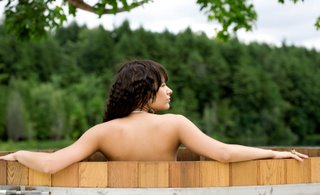
Soaking
Water, a powerful and restorative element in exquisite rituals throughout the ages, finds itself front and center in most spiritual rites of passage. Many cultures consider water essential for both physical and spiritual cleansing, and millions continue to embark upon quests to holy rivers and healing springs, drawn to water equally for its soothing properties as well as its promise of purification.
Perhaps this draw to water feels so instinctual because our brains, blood, and even our muscles are composed mainly of water. When we submerge ourselves, we return, in essence, to a deep, primordial connection with the world around us. Through the simple act of bathing, we can celebrate this ancient relationship between water and life. With minimal effort, a daily bath becomes a meditative and mystical experience, helping us to connect with our own inner wisdom.
“Mankind has used water to restore the physical, mental, and emotional body since ancient times,” says Barbara Close, founder of Naturopathica Holistic Health and author of Pure Skin: Organic Beauty Basics (Chronicle Books, 2005). “From the beginning, the use of water as a conduit or healing agent has existed for both its physical and emotional healing properties.”
Long before holy wells began to draw pilgrims or the custom of “taking the waters” became popular at lavish bathing halls in Europe, ancient cultures in Asia, Indonesia, and Mesoamerica had their own elaborate bathing rituals, which often involved the use of steam and ceremonial sound. Both the Aztec Temazcal and Mayan Zumbul-che wove in musical elements to signify the start of the cleansing ritual. In parts of today’s world, including Indonesia, Southeast Asia, and island nations of the Pacific, cultures still associate wells, springs, and rivers with the Goddess, the feminine principle, and birth. Women add flower petals to ritual water as an extra flourish, imbuing their bath with the powerful spiritual energy associated with native plants. In the Javanese bath ritual that prepares brides for their wedding night, attendants first scrub and exfoliate the skin with turmeric and then rub it with yogurt to soften it. A luxurious bath with flowers and petals follows, and only then is the bride deemed purity incarnate.
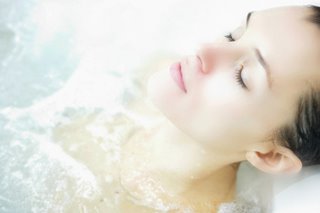
soaking in sacred water
“Each and every one of us, and every fragment of life on our planet, has an inner and outer relationship with water,” says Nadine Epstein, author (with Rosita Arvigo) of Spiritual Bathing: Healing Rituals and Traditions From Around the World (Celestial Arts, 2003). “The first living cells were formed in the salt bath of the sea, and I love imagining the blood that flows within us as a kind of internal sea. We are beings of water on a planet that is distinguished by its possession of water, the rushing waters that the early Jews called ‘living waters’ or mayyim hayyim.”
Ritual and renewal
You can connect with the healing energy of water by preparing your own spiritual bath at home. First order of business: Decide what you want to manifest in your life. The prospects run the gamut from the desire to release personal sadness or frustration to the hope of reducing global suffering. Next, establish the mood. The usual suspects, candles and incense, have traditionally been part of many prayer settings, but let your imagination run wild. Create an even richer ambiance by including specific music, scents, symbols, and images that resonate with your concept of the divine.
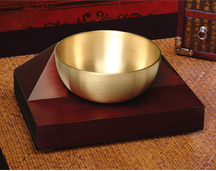
Set Your Singing Bowl Chime Timer for a Sacred Soak at Home
“Personally, I love singing and chanting on the surface of the water, watching the ripples of my breath, and soaking up the sounds in the air,” says Epstein. “I’ve always been fascinated by sound waves and how they travel through solids, gases, and liquids. As a little girl, I remember my father, a physicist, mapping the trajectory of sound waves through crystals. The symmetries of these waves were and are a beautiful thing to behold. It all boils down to connecting with what the Maya call ch’ulel, the Chinese call chi, the Hindus call prana. Nearly every culture has a name for the subtle energies or vibrations that exist within us and beyond.”
Ultimately, only the reverence with which we enter the water matters. If we are receptive enough, our immersions can gradually wring a sea change upon our spirit, teaching us that we can learn as much from floating as we can from standing on firm ground.
Liquid Assets
By varying water temperature, length of soaking time, and what you add to the bath, you can create a variety of healing environments.
“Adding herbal extracts and essential oils can intensify the healing experience,” explains Barbara Close, herbalist, aromatherapist, and founder of Naturopathica. “Essential oils are lipophyllic—meaning that they repel water and are attracted to fat-based substances such as the adipose tissue that makes up human skin. Baths are one of the most effective ways to utilize the benefits of aromatherapy. In addition to cleansing, essential oils can be used for their decongestant, diuretic, and antiseptic properties, as well as the emotional benefits they offer in quieting or energizing the body.”
In her book, Pure Skin: Organic Beauty Basics, Close offers the following guidelines for optimal bathing.
To relax, relieve stress, and promote restful sleep: Water temperature should be warm, about 92 to 100 degrees. Add essential oil of rose, lavender, mandarin, or neroli to water, swirling to disperse, and soak for 20 to 30 minutes. Be sure to set your Zen Chime Clock to end your soaking practice.
To energize, renew, and revitalize: Water should be tepid to cool, with temperature ranging from 80 to 92 degrees. Add essential oil of rosemary, lavender, or grapefruit. Soak for 10 to 15 minutes.
For detoxification: Water temperature should be between 100 and 110 degrees. Add essential oil of juniper, lemon, cypress, or grapefruit to water. Submerge body for no more than five to eight minutes; then rest quietly and allow blood pressure to return to normal.
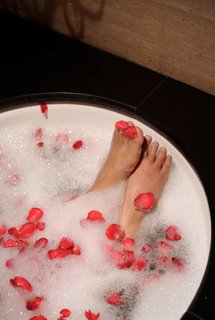
Flower Bath
Flower Baths
Recognizing plants as living, sentient beings, many cultures have traditions that involve bathing with flowers, such as the bridal preparation baths of Indonesia and the petal baths favored by the Incas. While easy to replicate, remember to use only organic flowers and herbs, as the pesticides and chemicals in conventionally produced botanicals may leach into your bath water and be absorbed through your skin. Whenever possible, gather the herbs and flowers yourself, giving appropriate thanks to the living plant as you harvest.
•• For an Incan bath as described in her book Spiritual Bathing, Nadine Epstein suggests gathering plants (the equivalent of a handful) on a sun-filled day between the hours of 11 a.m. and 4 p.m. Good choices include burdock, plantain, St. John’s wort, roses, zinnias, and marigolds or the leaves and flowers from herbs such as sage, thyme, and rosemary.
•• Place the flowers in a basin of water or other vessel that will accommodate 3 to 5 gallons of water. While chanting, reciting prayers, or setting a specific intention, gently squeeze the flowers with your hands, releasing their essence into the water. Allow the mixture to remain in the sunlight for several hours; then pour the water over your body in the shower or tub. (Be sure to cover your drain so that the plants don’t cause clogging.)
•• Appreciate the visual and olfactory pleasure of the plants. As Epstein says, “There is something hypnotic about the strikingly lovely, swirling, ever-changing patterns created by hollyhock and rose petals as they traverse the surface of water.”
adapted from Natural Solutions, March 2007 by Debra Bokur

Zen Chime Clock Headquarter Store
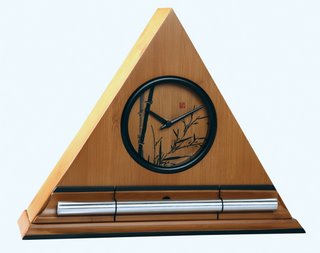
Bamboo Zen Alarm Clock with Chime
Now & Zen’s Singing Bowl Alarm Clock Shop
1638 Pearl Street
Boulder, CO 80302
(800) 779-6383
Posted in Hot Springs, Now & Zen Alarm Clocks, Well-being